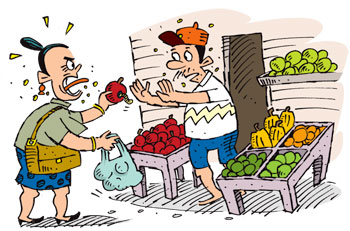Paying for others' sins

If Nehruvian canny is found in the expression 'there are two types of
people in the world' - those that do the work and others that get the
credit, its parallel of 'those that do not sin yet pay for some others'
sin, comes within Zoom Lens focus this week.
To avoid reader restlessness over what is being implied, let's start.
Last week I was at the Borella Super Market's fruit stall surveying my
desired purchase when finally my eyes rested on the huge pile of beli.
Being victim of rotten beli on numerous occasions, I told the vendor,
"Look, I want this for tomorrow morning and if no good I will return
it."
 "What? return? What do you mean? I at great cost buy all this stuff
and you want to return what you buy," yelled out the inelignant cauldron
bellied guy besides the beli fruits he sells. "What? return? What do you mean? I at great cost buy all this stuff
and you want to return what you buy," yelled out the inelignant cauldron
bellied guy besides the beli fruits he sells.
"But that's my right. I pay for it and if no good it's my right to
return," I snapped.
"You are looking at it from your side but what of losses incurred by
me? he asked holding me to ransom for his sins.
"Truly you are a sinner," I said leaving him to his irreconcilable
position and the pleasure of a last shot,
"Well, you have to sin to live." As I found my way out of the market
my mind did a flight 2007 years backwards to Jesus Christ who insisted,
'Man is a sinner'. Having paid for this wicked vendor's sins in the past
in the form of rotten beli, I decided 'no'..... I will certainly not be
bearer of his sins any more.
I went my way minus all purchases having got and given beli full
besides the rotten beli that may have been my breakfast curse the
following morning.
Reflecting on this very nauseating incident, it gradually dawned on
me how this petty, potty mudalali running a small two by two fruit stall
finds his neat parallel at macro level in the corporate conglomerate -
the difference being lounge suit swapped for the sarong what with
happenings in the international chain not far different from that of the
fruit seller.
Take for instance the high cost of food in starry hotels. Did you
ever realize the food we happily pick into bears the cost of whatever
wasted food as well" - the overcooked, spoilt, leftover and all what is
inedible. Paying for others sins eh?
Now let's get to the grocer and see how we pay for this guy's sins.
His incurred loss from a gunny load of substandard potatoes is always
recovered from the customer. My friend even overheard one grocer say "Monava
karannada paaduwa customergen allamu" .
In many shops customers cannot select purchases.If you do they'd say,
"If all were to select how would I run this shop?" he would ask
continuing in some undertones. He certainly has a point there. Yet as
counter argument could have it, why then mix substandard items with good
stuff.
Quality maintenance will not compel customers into being selective.
Of course, diluting the good is always to his favour, yet, he is firmly
into belief that customers have got to keep off the selecting spree.
So there you are, while you stand there all jaw dropped, the big
burly mudalali would rush a sales hand who adding misery to sorrow would
even kill you with kindness what with every other word followed by
'Madam' not to forget his toothpaste smile.
All the syndicated stuff, the good, bad and ugly is briskly parcelled
and handed over and there you are walking out of the shop with the
mudalali's sins. Once you've reached home you're lucky not to have your
wife around should she encounter at least two rotten potatoes let alone.
To a cantankerous woman, even one such would suffice to 'make your day'.
Incompatibility
Talking of shouldering others' sins, one finds in state inclined
organizations princely salaried nincompoops living off others' labour,
not to mention the incompatibility of salaries. Well paid nincompoops
sins are borne by least paid capable workers. Like to call it 'shining
on other's feathers? Why not?
Apart from transferring sins, they also get credit for whatever tasks
they cannot perform yet get others to do so. Wanna call it a Nehruvian
stroke? Yeh!
In this scenario, one thing is crystal clear - the scales being
heavily tipped towards the more powerful. Tension and frustration are
sure to follow. Systemic survival itself is sinful as man within this
enclave is constantly in tow with moral inadequacies. Invariably this
brings to columnist's mind Jesus' pronouncement. 'If you want to come
into my kingdom, be like a child.'
Truly, in a child's world devoid of identity discourses, truthfulness
is pervasive. This justifies the court of law into acceptance of a
child's word. Yet with systemic corruption on the rise, one doubts the
presence of even innocent children, leaving room for an altered version
of Christ's expression 'If you want to come into my kingdom be like an
infant.'
This apart, while the Buddha in his 550 births reportedly sinned and
was sinned against, Christ's crucifixion depicts what it is like to pay
for another's sins never mind the sins of his assassins which is always
overlooked for some reason or the other.
[email protected]
|
